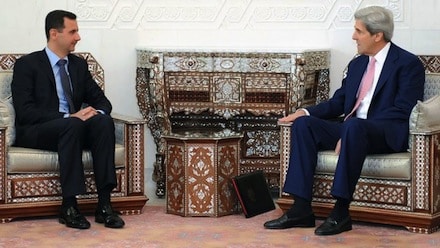In Washington DC, consistency is considered a vice, never a virtue. It is for this reason that many in Washington, especially the neoconservatives, consider their foreign policy one of virtue. You would think that our political leaders, both in the Republican and Democratic parties, would learn something from the devastating effects of our very inconsistent foreign policy, especially after the last 15 years. The chaos that we have brought to Iraq and Afghanistan should be a loud and clear message to anyone who has ears to hear.
We now get the message from our current Secretary of State John Kerry that it’s time to “reignite” negotiations with Assad for the purpose of ending the conflict in Syria. I guess it’s better late than never, but after more than four years of us needlessly meddling in the internal affairs of Syria, it’s about time. Of course we as Americans, as well as the entire Middle East, would have been better off if we had never adopted the policy in August 2011 that “Assad must go.” What is never realized is that, no matter whether we’re intervening with good intentions or not, our involvement in countries halfway around the world only makes things worse.
Of course now it becomes “practical” for us to deal in an entirely different manner with Assad since we cannot handle the chaos in Syria that we helped bring about. As a consequence of our policy, ISIS has become a dominant force in the region to the point where we welcome military assistance, at least for now, from our stated enemy, Iran. Currently Secretary of State John Kerry is expressing his desire to bring about a successful diplomatic solution to this mess. Kerry has even acknowledged, “everybody agrees there is no military solution.” He is in agreement now that there is only a “political solution.” What is so aggravating is that there were plenty of people in this country who knew this five years ago — and for that matter who had the same opinion about the insanity of our aggressive policy in Iraq, which started in 1990 but was greatly accelerated with the invasion in 2003.
Foolishly, and to me somewhat surprisingly, President Obama declared he was drawing a red line that President Assad was not to cross. His warning made in August 2012 was for Assad not to use any chemical weapons. But all this did was set the stage for the next escalation in the unnecessary military confrontation with Assad. A year later the war propagandists declared that indeed Assad did cross the red line and used chemical weapons against the rebels. Of course there was never any evidence that this actually occurred and more likely it was the rebels that used the gas in a minimal way. It was conceivably a false flag and served to escalate the war. However public pressure was then put on Obama to respond with force and start outright bombing of the Syrian government and getting rid of President Assad by force.
President Obama in September 2013 decided that he should get Congressional approval to proceed. Though it looked originally like it would be easy to get this authority, once the American people became aware of the seriousness of the problem, they expressed their outrage and President Obama was forced to withdraw his request. Approximately two-thirds of the American public opposed this military escalation and this obviously had a bearing on the change in policy.
So once again our leaders who are tolerant of inconsistencies have shifted to solving the problems in Syria through diplomacy rather than depending on military force. This is a better way to go than depending on expanding the war. But there is even a better way to deal with this. Consistently stay out of the internal affairs of other nations and avoid all entangling alliances that prompt our political leaders to consistently make mistakes by pursuing a foreign policy that makes no sense and is of no value to the American people. Eventually bankruptcy and anger directed toward America will dictate a total shift away from the policies of the neoconservatives that have plagued us for too long.


